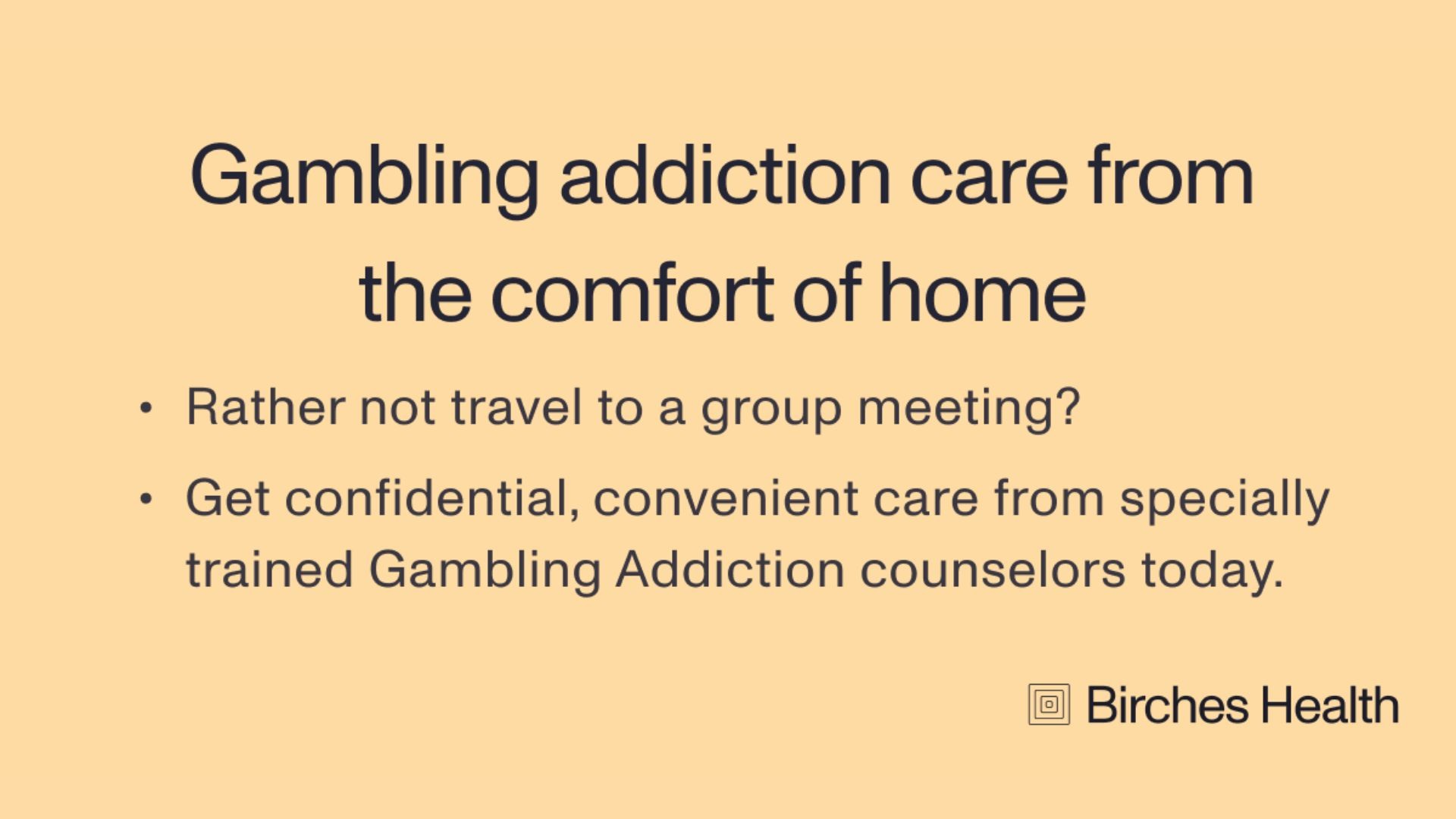Definition of Gambling Addiction, Problem Gambling, Gambling Disorder
Published:
Jul 9, 2025
,
02:06 p.m.
ET
Key Points:
Gambling addiction is a serious mental health condition characterized by continued, compulsive gambling despite harmful consequences.
Major medical dictionaries and diagnostic manuals like the DSM-5 and ICD-11 offer formal definitions and diagnostic criteria.
Recognizing early warning signs is critical to avoiding serious gambling-related harms.
Treatment options are available, accessible and effective, including virtual therapy with Birches Health.
—————
The terms “gambling addiction," "problem gambling," "compulsive gambling," and "gambling disorder" are often used interchangeably, and that’s because they all describe the same core issue: persistent and harmful gambling behavior that disrupts an individual’s life.
There are, however, very subtle differences in meaning between these terms. “Problem gambling” is generally used more broadly to describe gambling behavior that causes negative consequences for the individual or others. When used, it can refer to a range of mild issues to severe addiction.
“Gambling disorder” is most often used in a clinical sense, and refers to persistent and recurrent problematic gambling behavior that leads to impairment or distress.
“Compulsive gambling” emphasizes loss of control over gambling impulses.
In this article, we’ll focus mostly on the term "gambling addiction" to explore its definitions, clinical diagnoses, warning signs and treatment options.
Dictionary definitions of Gambling Addiction
The term “gambling addiction” highlights the potentially addictive nature of the behavior and brings it closer to substance use disorders. It is often used to describe a severe form of problem gambling. Several well-known dictionaries provide definitions that frame gambling addiction as a compulsive and harmful behavioral pattern:
Merriam-Webster defines "gambling addiction" as a compulsive, chronic need to gamble despite negative consequences, leading to significant harm in various areas of life.
Oxford Dictionary describes it as a state of being dependent on or habitually engaging in gambling behavior, often with negative consequences.
Cambridge Dictionary refers to gambling addiction as an inability to stop gambling despite it being harmful, describing a compulsive gambler as someone who cannot stop risking and losing money in hopes of winning more, often at great personal and/or familial costs.
These definitions emphasize the adverse effects of gambling, generally aligning with clinical perspectives and modern research findings.
Clinical definitions and diagnoses of Gambling Addiction
Medical and mental health professionals use standardized diagnostic tools to define and classify gambling addiction. The two most commonly referenced are the DSM-5 and the ICD-11.
DSM-5 Criteria for Gambling Disorder
The Diagnostic and Statistical Manual of Mental Disorders (DSM-5), published by the American Psychiatric Association, provides a clinical definition of gambling addiction as:
"Persistent and recurrent problematic gambling behavior leading to clinically significant impairment or distress."
To be diagnosed, a person must exhibit at least four of the following nine criteria within a 12-month period.

ICD-11 Classification
The International Classification of Diseases (ICD-11), developed by the World Health Organization (WHO), includes Gambling Disorder under the code 6C50, with subcategories for online and offline gambling.
According to the ICD-11, the core diagnostic features include: impaired control over gambling, increased priority given to gambling over other interests and continuation despite negative consequences.
Symptoms must cause significant functional impairment and persist for at least 12 months, although shorter durations may qualify if symptoms are severe.
Warning signs of Gambling Addiction
Recognizing the signs of gambling addiction is key to early intervention. Common indicators include:
Obsessively thinking about gambling.
Repeated attempts to quit gambling fail.
Being secretive or dishonest about gambling activity.
Continuing to gamble despite job loss, debt or relationship damage.
Experiencing withdrawal symptoms like irritability or anxiety when not gambling.
Neglecting responsibilities or self-care.
Stealing or committing illegal acts to fund gambling.
Feelings of guilt or remorse after gambling, often leading to more gambling to cope.
Mood swings tied to gambling outcomes.
These behaviors can significantly disrupt a person's life, underscoring the importance of timely treatment.
Gambling Addiction treatment options in the U.S.
Gambling addiction is a clinically recognized mental health disorder with clearly defined diagnostic criteria and effective treatment options. Whether you call it problem gambling, compulsive gambling or gambling disorder, what matters most is recognizing the signs and seeking help early.
The approach to gambling addiction treatment depends on the severity of the condition but may include: Cognitive Behavioral Therapy (CBT), group counseling and/or peer support, medication, or inpatient or outpatient rehabilitation programs.
Birches Health offers personalized, evidence-based treatment for gambling addiction entirely online. Birches’ team of licensed clinicians is trained in addressing gambling disorder and any related mental health challenges.
If you or a loved one may be struggling with sports betting or another form of gambling, Birches Health offers confidential and accessible care designed to support long-term recovery.
There are multiple ways to get started confidentially with Birches Health:
Call 833-483-3838
Email help@bircheshealth.com





